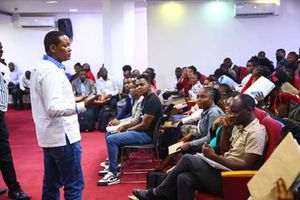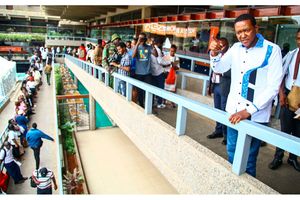
In Kenya, a course in biochemistry takes four years, with the curriculum consisting of core courses in chemistry, biology, and physics.
Biochemistry, the study of the chemical and physical processes within living organisms, offers promising career opportunities for those who study it.
However, many biochemistry graduates today struggle to find employment in their field. Some choose to further their education, while others venture into fields such as teaching, research, pharmaceuticals, forensic science, agriculture, and environmental management.
In Kenya, a course in biochemistry takes four years, with the curriculum consisting of core courses in chemistry, biology, and physics.
Institutions such as the University of Nairobi, Jomo Kenyatta University of Agriculture and Technology, and Kenyatta University offer Bachelor of Science degrees in Biochemistry.
Career opportunities available to biochemists include agriculture, medicine, food science, and biotechnology. Students of this course need to be well-versed in chemistry, physics, and mathematics.
“In developed countries like the United States, food processing and biotechnology are thriving industries that provide a constantly growing job market for biochemists. The market there always needs improved biochemical solutions. Developing countries may have problems such as fewer resources and access to advanced technology.
"There is also a gap between what can be taught in universities and what industries require. The universities in Kenya, however, focus more on offering general knowledge, while industries can require specific skills that are traditionally learned on the job by biochemists,” says Professor Francis Mulaa, a biochemist and the Deputy Vice Chancellor at the University of Nairobi.
So, in a developing country like Kenya, is this highly technical course worth pursuing?
Beatrice Oyoo, 24
Master’s student (food science) University of Pretoria
I completed my Bachelor of Science degree in Biochemistry in 2023 at the University of Nairobi. Initially, I wanted to study pharmacy or nursing. When I applied to university, the grading system had changed, and I no longer qualified for those courses.

Beatrice Oyoo, 24, transitioned From Biochemistry to food science. She is shaping the future of wellness and food security, one step at a time.
Instead, I was accepted into a Bachelor of Arts degree in Anthropology. However, after just one semester, I realised it wasn’t the right fit for me, so I switched to Biochemistry. The move wasn’t easy, but it was rewarding.
As a biochemist, I thought I would work in food research or quality control, which involves testing products to determine if they meet the required specifications.
I saw myself working at research institutions like the Kenya Medical Research Institute (KEMRI). Unfortunately, I quickly found out that these positions were highly competitive, and I struggled to get a job since I had neither a mentor nor connections. I applied to KEMRI several times but wasn’t successful.
In my last year of university, I became interested in tech, especially web design. I taught myself online and later worked in a sales role for an e-commerce company. Six months later, my former lecturer recommended me for a sales position, which gave me valuable work experience.
After graduation, through the recommendation, I worked as a medical sales representative for 10 months in a pharmaceutical company. Many biochemistry graduates end up in medical sales because there are few job opportunities in the industry. Biochemists can work in food production, but companies prefer those with food science degrees. The job market is competitive, and employers want experience.
In January 2024, I resigned from my sales job to take up a Master’s degree in South Africa, which I applied for through the MasterCard Foundation Scholars Programme.
I’m always open to learning new things, so this year, I’m working on improving my public speaking skills. I also mentor young professionals. I noticed that many young people lack workplace skills, so I organise webinars on topics like emotional intelligence and financial literacy to help them.
In high school, I feared mathematics, but the biochemistry course helped me believe in myself. It taught me to think critically and be resilient. Although I’m not pursuing a career in Biochemistry now, I’m glad I studied it. If I could go back, I would choose a career in tech where there are more job opportunities.
As I continue my studies in food science, I’m excited about working in the food industry. Food is essential to everyone, and issues like food security and GMOs (Genetically Modified Organisms) are important to me. I’m passionate about wellness, and I believe it all starts with food.
I’ve learned that graduation isn’t the end, it’s just the beginning. There is always an opportunity to keep learning, adapt, and find new paths that align with your passions.
If I could give career advice, I’d tell everyone to follow their passion and to be open to new opportunities. You’ll never know what you truly enjoy unless you try different things.
Kevin Orina, 24
Bachelor’s degree in biochemistry
I’ve always had a passion for science. In high school, I knew I wanted to pursue a science course, and biochemistry became my second choice after I didn’t qualify for a medicine course.
I was excited to study biochemistry at the university, but I struggled with complex topics like molecular pathways and enzyme functions. Despite the challenges, I learned a lot about DNA, drug reactions, and more, which deepened my interest in biochemistry.

Kevin Orina, 24, is a Biochemist by training and, entrepreneur by passion. Kevin is growing his future in food science, one mushroom at a time.
At first, I wanted to become a research scientist. Growing up, I admired scientists and dreamed of making new inventions. As an undergraduate student, I even wrote a proposal for a project to develop a cancer testing flow strip. I was passionate about making a difference.
Since my original plan was to study medicine, I thought I could still find a place in research institutions like KEMRI or the Livestock Research Institute, but I soon realised that a Master’s or PhD is often required for higher-level roles in research. Many researchers had advanced qualifications, and I understood that further education was necessary to reach my career goals.
In the meantime, I started my mushroom farming business. While it is still in the early stages, I remain hopeful for the future. I apply my biochemistry knowledge to improve my farming practices, and I believe my business will grow.
I’m still passionate about biochemistry, and I hope one day I’ll secure a good job in the field, or that my business will succeed, allowing me to become the CEO of my own company. To fund my mushroom farm, I work as a laborer on construction sites.
I considered studying business management to help with running my startup, but I was limited by financial challenges. I’ve decided to stick with biochemistry because I love the subject.
I don’t think my struggles in finding a job are due to a lack of skills, but because biochemistry is a competitive field. Patience and networking are key to landing a good job. Perhaps I should have focused more on networking with other biochemists and built stronger connections. However, I know the right opportunity will come along.
After my graduation in 2021, I became demoralised after applying for several jobs without success. I even started feeling depressed. But starting my mushroom farm reignited my hope and gave me purpose. I believe the government and other organisations should create science hubs to offer resources and mentorship to help young scientists gain valuable experience and connect with larger companies.
Unfortunately, such hubs don’t exist in Kenya.
While I’m not where I want to be in my career, I’m not giving up. I’m committed to pursuing my passion for biochemistry and growing my mushroom farming business.
Barnabas Omufira, 23
Teacher of biology and chemistry, Bukhaywa Secondary School, Kakamega
In high school, I noticed that many students had a negative attitude towards science, and I wanted to change that.

Barnabas Omufira, 23, is a teacher of science, inspiring curiosity, and lighting the way for the next generation of STEM leaders through his biochemistry skills and knowledge
My goal was to make science more engaging and encourage students to become curious about STEM (Science, Technology, Engineering, and Mathematics) subjects.
At first, I wanted to become a neurosurgeon, but I later decided to pursue teaching and focus on biology and chemistry. I graduated from the University of Kabianga in Kericho in November 2024.
My teaching journey began right after high school when my former school invited me to help the teaching staff as a BOM (Board of Management) teacher. I started teaching during school holidays and, after completing my exams in April 2024, I got a job at St Thomas Shikum High School in Kakamega as a biology and chemistry teacher.
Mentoring students on career options has always been important to me. Since 2020, I’ve been actively involved in guiding students to understand their career paths and how to navigate their futures. The job market has been welcoming, and a number of schools have reached out to me for teaching positions.
The demand for biology and chemistry teachers is high, and I’ve found many opportunities in the field.
Thanks to my strong network with principals and educators, I was able to secure teaching jobs easily.
For example, when there was a recruitment drive, I was in high demand because of the need for biology teachers. However, I decided to stay at my current school as I was still processing my teaching registration.
With a flexible mindset and necessary skills, you can find work in various areas of education. While at university, I was part of the marketing team for the Entrepreneurship and Innovation Club. We encouraged students to pursue innovative ideas and STEM courses to solve problems in the community.
This experience helped me understand the importance of fostering innovation in students. Internships and teaching practice are also valuable for gaining experience.
Teaching biology and chemistry is demanding, especially the practical lessons. I had to spend extra time in the lab to prepare well for lessons. Research and reading became part of my routine to ensure I had the correct information to teach effectively.
To engage my students, I use various strategies. One of these is mentoring. I try to show my students the benefits of studying biology and chemistry at the university level. I also organise trips through the school to nearby universities, like Masinde Muliro University, where students can meet others pursuing similar courses.
This helps motivate them. We also hold symposiums and events where students interact with others from different schools. These activities spark curiosity and help them gain a deeper understanding of science.
My journey as a teacher has been fulfilling. It’s not just about teaching content; it’s about inspiring curiosity and guiding students toward careers in STEM fields. I hope to see even more students pursuing their dreams in science and innovation.
Daisy Awuor, 24
Medical sales representative in the pharmaceutical industry
Initially, I didn’t have an interest in biochemistry. I was always passionate about the medical field, but in high school, I struggled with subjects like biology, and I did not get the required grades to pursue medicine.
At first, I thought of studying Medical Laboratory Sciences, but I missed the required marks by a few points. I explored veterinary medicine, but my brother advised against it. I then realized that I qualified for biochemistry – a field I hadn’t heard of before.

Daisy Awuor, 24, is using her biochemistry knowledge to shape her journey in her role as a media sales representative.
Since it was part of the School of Medicine, I saw it as an opportunity to be part of the medical field, so I enrolled in the biochemistry program at The University of Nairobi in 2018.
I learned that biochemistry offers a wide range of career opportunities, including teaching, research, and work in the food industry. I became particularly interested in plant biochemistry. My goal was to graduate with a first-class or upper-second-class degree to increase my chances of getting a scholarship for a Master's degree, as biochemistry graduates often need further qualifications to enter research fields.
However, after graduation in 2023, I faced challenges with my certificate, which delayed my application for further studies.
I ended up taking various jobs, including sales and online writing to keep busy. Eventually, one of my university mentors connected me to a medical representative position, which I began in April last year.
Although the role isn’t entirely aligned with biochemistry, it allows me to apply a bit of what I learned, particularly in explaining the mode of action of drugs.
While the medical representative field is more focused on sales, I haven’t regretted my decision to study biochemistry. I still aspire to further my studies, possibly in the pharmaceutical industry or even pursue a managerial career in the future.
The job market for biochemistry graduates in Kenya is challenging. Research positions are limited, and many graduates are either underemployed or working in unrelated fields.
There are few research institutes, and with biochemistry programmes available at many universities now, competition for research roles is very high. Most biochemistry graduates end up in medical-related jobs, like medical sales or nutrition.
I’ve met many biochemistry graduates struggling to find jobs in research, and even those in pharmaceutical fields often face challenges with low pay and job insecurity. While my dream was to work in research, I’ve adapted to the medical sales field, and I’m open to different opportunities.
I’ve learned the importance of being open-minded and not staying fixated on a single career path. My advice to other graduates is to be adaptable, keep learning, and be open to new opportunities.
I’m still considering further studies and career advancement. I’m interested in taking short courses to improve my skills and eventually aim for a managerial position in the pharmaceutical industry. Although this wasn’t the exact path I expected, I’m learning to navigate the job market, and I’m hopeful that my flexibility will lead me to success.
moochieng@ke.nationmedia.com









